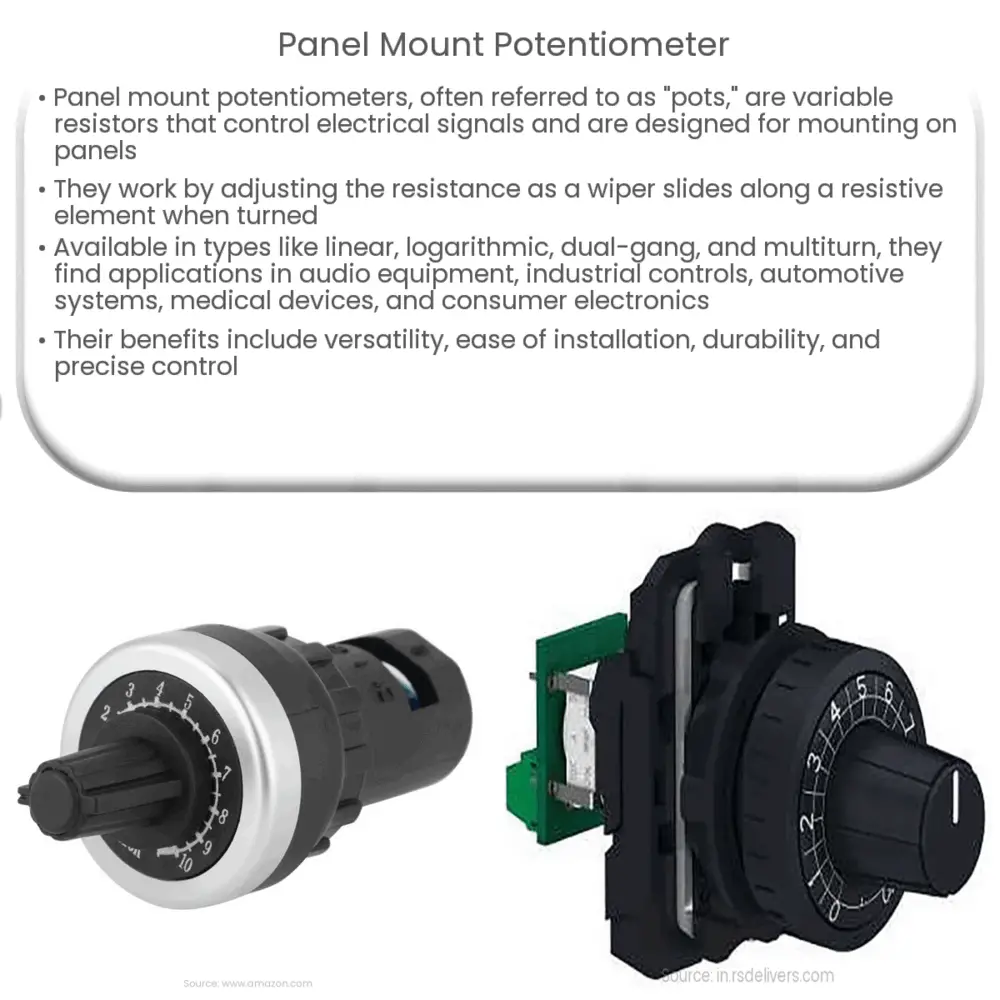A panel mount potentiometer is a versatile variable resistor, designed for easy installation on panels, offering precise control in various applications across numerous industries.

Panel Mount Potentiometer: A Comprehensive Guide
Introduction
A panel mount potentiometer is an essential component in the world of electronics, with a wide range of applications in various industries. Potentiometers, also known as “pots,” are variable resistors that allow users to adjust and control electrical signals. The panel mount potentiometer is specifically designed to be mounted on a panel or enclosure, making it an ideal choice for many projects. In this article, we will explore the features, applications, and benefits of panel mount potentiometers.
How Panel Mount Potentiometers Work
Panel mount potentiometers consist of three main components: a resistive element, a wiper, and a shaft. The resistive element is typically made of a conductive material like carbon, cermet, or conductive plastic. The wiper, which is connected to the shaft, slides along the resistive element as the shaft is turned. This alters the resistance between the wiper and the potentiometer’s terminals, thus varying the output voltage.
The potentiometer’s output voltage is proportional to the position of the wiper on the resistive element. When the wiper is at one end of the resistive element, the resistance is at its maximum value, and when it is at the other end, the resistance is at its minimum value. By turning the shaft, users can finely adjust the output voltage to achieve the desired level of control in their application.
Types of Panel Mount Potentiometers
There are several types of panel mount potentiometers available in the market, each with its unique features and benefits. Some common types include:
- Linear Potentiometers: These potentiometers have a linear relationship between the position of the wiper and the output voltage, making them suitable for applications requiring a consistent and predictable response.
- Logarithmic Potentiometers: Also known as “audio taper” potentiometers, these have a logarithmic relationship between the wiper’s position and the output voltage. They are often used in audio applications, as the human ear perceives sound in a logarithmic manner.
- Dual-Gang Potentiometers: These potentiometers consist of two separate pots mounted on a single shaft, allowing for the simultaneous control of two separate circuits. This is useful in applications like stereo audio systems, where both channels need to be controlled simultaneously.
- Multiturn Potentiometers: As the name suggests, these potentiometers allow for multiple rotations of the shaft, providing a higher level of precision and a wider range of resistance values. They are commonly used in applications where fine-tuning is required.
Applications of Panel Mount Potentiometers
Panel mount potentiometers find applications in a variety of industries and devices, some of which include:
- Audio Equipment: In devices like amplifiers, mixers, and equalizers, potentiometers are used for adjusting volume, balance, and tone controls.
- Industrial Controls: Potentiometers are used in motor controllers, temperature controllers, and power supply units to regulate voltage and current levels, ensuring the smooth functioning of equipment.
- Automotive Industry: They are used in systems like climate control, wiper speed adjustment, and dashboard dimmer switches to provide adjustable control.
- Medical Devices: Panel mount potentiometers are used in devices like infusion pumps, ventilators, and diagnostic equipment for precise control of parameters like flow rate, pressure, and temperature.
- Consumer Electronics: In products like televisions, game consoles, and lighting systems, potentiometers are used for adjusting settings like brightness, contrast, and color balance.
Benefits of Panel Mount Potentiometers
There are several advantages associated with using panel mount potentiometers, which include:
- Versatility: Due to the wide range of available types and configurations, panel mount potentiometers can be used in various applications, making them a versatile option for designers and engineers.
- Easy Installation: Panel mount potentiometers are designed for quick and straightforward integration into panels and enclosures, making them ideal for projects with space constraints or tight deadlines.
- Durability: High-quality panel mount potentiometers are built to withstand harsh environments, including temperature fluctuations, moisture, and vibration, ensuring long-lasting and reliable performance.
- Precision Control: With features like multiturn configurations and high-resolution wipers, panel mount potentiometers offer precise control over a wide range of resistance values, making them suitable for applications that demand fine-tuning.
Conclusion
Panel mount potentiometers are valuable components that offer a high degree of versatility, precision, and durability. They are widely used across various industries, including audio equipment, industrial controls, automotive systems, medical devices, and consumer electronics. With a thorough understanding of the different types, applications, and benefits of panel mount potentiometers, designers and engineers can make informed decisions when selecting the most suitable potentiometer for their specific project needs.

